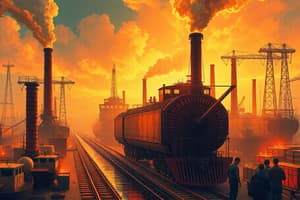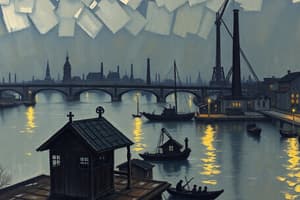Podcast
Questions and Answers
What is a market economy?
What is a market economy?
- An economy controlled entirely by the state
- An economy where prices are determined by supply and demand (correct)
- An economy with no trade or commerce
- An economy based on planned economy principles
What is capitalism?
What is capitalism?
An economic and political system where trade and industry are controlled by private owners for profit.
What does innovation refer to?
What does innovation refer to?
A new idea or more effective device or process.
What was the Second Industrial Revolution?
What was the Second Industrial Revolution?
Who was George Pullman?
Who was George Pullman?
What did George Westinghouse invent?
What did George Westinghouse invent?
What is the Bessemer Process?
What is the Bessemer Process?
Who was Samuel Morse?
Who was Samuel Morse?
What is a telegraph?
What is a telegraph?
Who is credited with inventing the first practical telephone?
Who is credited with inventing the first practical telephone?
What is a transatlantic cable?
What is a transatlantic cable?
Name one major invention by Thomas Edison.
Name one major invention by Thomas Edison.
Who were Wilbur and Orville Wright?
Who were Wilbur and Orville Wright?
What did Madame C.J. Walker develop?
What did Madame C.J. Walker develop?
What is Elijah McCoy known for?
What is Elijah McCoy known for?
Who was the first African American woman to receive a patent?
Who was the first African American woman to receive a patent?
What did Lewis Howard Latimer patent?
What did Lewis Howard Latimer patent?
What was Jan Ernst Matzeliger's invention?
What was Jan Ernst Matzeliger's invention?
What is a mail-order house?
What is a mail-order house?
What is a corporation?
What is a corporation?
What does stock refer to in a business context?
What does stock refer to in a business context?
What is an entrepreneur?
What is an entrepreneur?
Who was Andrew Carnegie?
Who was Andrew Carnegie?
Who was John D. Rockefeller?
Who was John D. Rockefeller?
What is vertical integration?
What is vertical integration?
What is horizontal integration?
What is horizontal integration?
What are trusts in an economic context?
What are trusts in an economic context?
What is a monopoly?
What is a monopoly?
What was the Sherman Antitrust Act?
What was the Sherman Antitrust Act?
Who was Henry Flagler?
Who was Henry Flagler?
What is the Florida East Coast Railroad?
What is the Florida East Coast Railroad?
What does government policy refer to?
What does government policy refer to?
What is government regulation?
What is government regulation?
What are business practices?
What are business practices?
What are industrial developments?
What are industrial developments?
What is the 1st Industrial Revolution?
What is the 1st Industrial Revolution?
Study Notes
Economic Systems and Key Figures
- Market Economy: Operates on supply and demand with pricing determined through a free price system.
- Capitalism: System where trade and industry are privately owned for profit instead of being controlled by the state.
Innovations and Industrial Pioneers
- Innovation: Refers to new ideas or processes that improve solutions to existing needs.
- Second Industrial Revolution: Spanning 1870 to 1914, marked by groundbreaking inventions, including events dating back to the 1850s.
- George Pullman: Engineer and industrialist known for the Pullman sleeping car and creating Pullman, a company town for workers.
- George Westinghouse: Inventor of the railway air brake and a significant contributor to the electrical industry.
Communication Advances
- Samuel Morse: Inventor of the single-wire telegraph system; developed Morse code.
- Telegraph: A long-distance message transmission system using electrical signals.
- Alexander Graham Bell: Credited with inventing the first practical telephone.
- Transatlantic Cable: An undersea cable used for telegraph communications; the first one laid across the Atlantic Ocean.
Notable Inventors
- Thomas Edison: Influential inventor known for the phonograph, motion picture camera, and electric light bulb.
- Wilbur and Orville Wright: Brothers who invented the first successful airplane and achieved controlled, powered flight.
- Madame C.J. Walker: Entrepreneur who created successful hair products for African American women.
- Elijah McCoy: Notable for 57 patents, primarily for steam engine lubrication.
- Sarah Goode: First African American woman to receive a patent for a fold-away bed.
- Lewis Howard Latimer: Improved method for producing carbon filaments in electric light bulbs.
- Jan Ernst Matzeliger: Invented a machine that significantly reduced shoe production costs.
Business Concepts
- Mail-Order House: Retail firm selling merchandise via mail, providing catalogs and circulars to customers.
- Corporation: A legally recognized entity allowing group action as a single person.
- Stock: Capital raised by companies through the issuance of shares.
- Entrepreneur: Individual organizing and operating a business while taking higher financial risks.
Industrial Leaders and Their Impact
- Andrew Carnegie: Scottish American who expanded the steel industry, establishing Carnegie Steel and donating $350 million to charities.
- John D. Rockefeller: Founder of the Standard Oil Company, which revolutionized the oil industry and philanthropy.
- J.P. Morgan: Influential banker who merged companies to form General Electric and the United States Steel Corporation.
Business Strategies
- Vertical Integration: Control of the supply chain by one company, producing various products or services.
- Horizontal Integration: Acquiring similar companies in the same industry to create a monopoly.
- Trusts: Economic method for managing stocks of multiple companies to eliminate competition.
Regulations and Policies
- Monopoly: Exclusive control over a specific product or industry.
- Sherman Antitrust Act: First federal law against monopolies, initially misapplied against labor unions.
- Government Policy: Principles guiding government actions and legislative processes.
- Government Regulation: Laws governing business operations to prevent financial crises.
Industrial Growth
- Industrial Developments: Significant technological advancements in communication and transportation, including railroad networks.
- 1st Industrial Revolution: A transformative period (1760-1840) characterized by inventions powered by water and steam, fundamentally changing textile industries.
Studying That Suits You
Use AI to generate personalized quizzes and flashcards to suit your learning preferences.
Description
Explore the evolution of economic systems from market economies to capitalism. Discover key figures like George Pullman and Samuel Morse who played significant roles in industrial advancements and communication innovations. This quiz covers important inventions and their impact on society.




